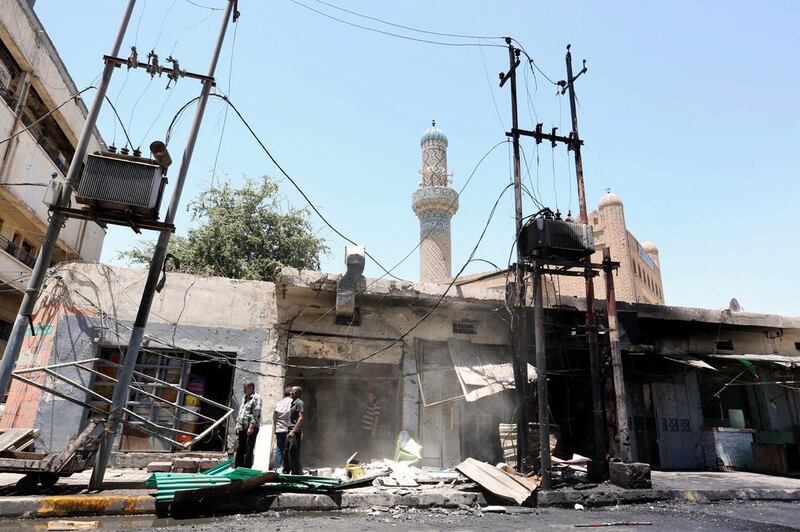BAGHDAD // Suicide bombings claimed by ISIL killed at least 27 people in Baghdad as Iraqi forces fight to retake the last extremist-held areas in Mosul.
In the deadliest of the two attacks, a suicide bomber detonated explosives rigged up to a vehicle outside a popular ice cream shop at around midnight on Monday, killing 17 people and wounding 32.
The bomber struck just days after the start of Ramadan, during which Iraqis often stay out late shopping or socialising after breaking their daily fast.
A closed-circuit camera captured the moment of the night-time explosion outside the ice cream parlour in the bustling Karrada neighbourhood of central Baghdad. The video shows a busy downtown avenue, with cars driving down the street when the blast goes off. A huge fireball then engulfs a building, forcing the cars to scramble to get away. Other videos of the attack posted on social media show wounded and bloodied people crying for help on the pavement outside the Al Faqma ice cream shop.
ISIL issued statements claiming the ice cream shop blast and the later bombing, saying both were suicide car bombings targeting members of Iraq’s Shiite Muslim majority, whom ISIL considers to be heretics.
Brett McGurk, the US envoy to the international coalition fighting ISIL, condemned the attack and expressed solidarity with Iraq. He tweeted, “ Terrorists tonight in Baghdad target children & families enjoying time together at an ice cream shop. We stand w/Iraq against this evil.”
In the second attack, a suicide bomber blew up a bomb-rigged vehicle near the country’s main pension office, which is close to one of the principal bridges over the River Tigris.
That attack killed at least 14 people and wounded at least 40.
Later on Tuesday, seven people died and 19 were wounded in four separate bombings in and around Baghdad, according to officials. The attacks targeted commercial areas and a patrol of Sunni anti-ISIL tribal fighters. No group immediately claimed those attacks.
During Ramadan last year, another section of Karrada was hit by massive suicide bombing that killed almost 300 people, the deadliest single attack in the Iraqi capital in 13 years of war. ISIL also claimed that atrocity.
Details of how the militants managed to stage Tuesday’s attacks were not immediately clear. After last year’s attack, Iraqi authorities stepped up security in Karrada, especially in the area of the bombing.
The attacks in Baghdad come as Iraqi forces fight to retake the last ISIL-held areas of Mosul, a city that was once the extremists’ most emblematic stronghold.
Iraqi forces are more than seven months into a massive operation to retake the city from IS, and have already recaptured its whole east side and much of the west.
Three neighbourhoods north of Mosul’s Old City – Al Shifaa, Al Saha and Al Zinjili – are now the target of a broad assault by Iraqi soldiers, police and special forces that was launched last week.
On Tuesday, an Iraqi army officer said that security forces were proceeding slowly in Al-Shifaa in a bid to protect infrastructure.
“The problem is that it is a neighbourhood with four or five hospitals,” Brigadier General Shakir Kadhim Mohsen said in Mosul. Iraqi forces have permission to “take more time to spare the infrastructure and keep the civilians safe”.
He said ISIL was now relying heavily on snipers and suicide bombers because they had lost so many sites which were previously used for making explosives and were running low on supplies of bombs and mortar rounds.
“There are 50 to 100 fighters moving from one building to another in Al-Shifaa,” he said.
The United Nations has warned that up to 200,000 civilians who are believed to remain in ISIL-held areas of the city are in grave danger and that large numbers could flee.
“We are deeply concerned that right now, in the last final stages of the campaign to retake Mosul, that the civilians ... in (ISIL) areas are probably at graver risk now than at any other stage of the campaign,” said Lise Grande, the UN humanitarian coordinator for Iraq.
She said the UN estimates there are between 180,000 and 200,000 civilians in extremist-held areas of Mosul, the majority of them in the Old City.
The Old City, a warren of closely spaced buildings and narrow streets, has posed a significant challenge to Iraqi forces.
Families who managed to flee ISIL-held areas have told the UN that food, water and medicines are in short supply and that snipers fire on civilians who try to leave, Ms Grande said.
* Agence France-Presse





